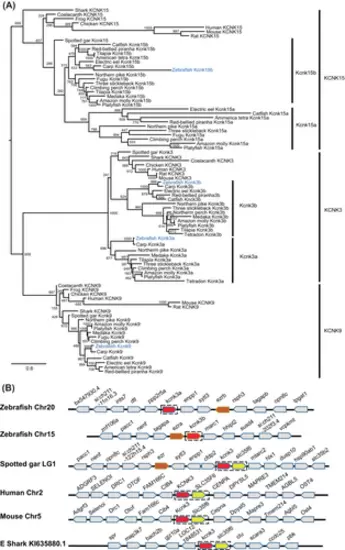Fig. 10
- ID
- ZDB-FIG-240802-21
- Publication
- Park et al., 2024 - Evolution of two-pore domain potassium channels and their gene expression in zebrafish embryos
- Other Figures
- All Figure Page
- Back to All Figure Page
|
The kcnk3 and kcnk15 genes were duplicated in teleosts, including zebrafish. (A) Molecular phylogenetic tree generated using maximum likelihood analysis on vertebrate tandem of pore domains in a weak inward rectifying K+-related acid-sensitive K+ (TASK) channel proteins as obtained with Jones–Taylor–Thornton model plus gamma distribution. Numbers at each node denote bootstrap values based on 1000 replicates. Branch lengths are proportional to expected replacements per site. The KCNK3, KCNK9, and KCNK13 channels formed distinct clades. The zebrafish TASK channels were highlighted in blue. Teleost Kcnk3 and Kcnk15 channels formed two subbranches within the KCNK3 and KCNK15 clade, respectively. (B) The synteny of KCNK3 in five representative vertebrate species. The illustration of the genes and their sizes are not proportional to the length of the distances between genes. KCNK3 was highlighted in red. The conserved synteny (kcnk3–slc35f6) was boxed with dashed lines. |

